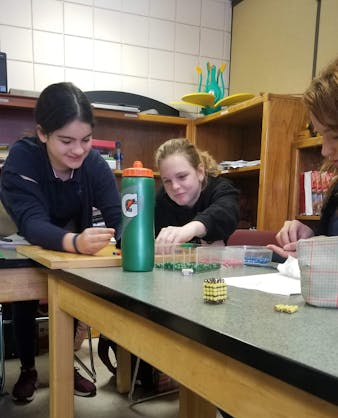Middle School
The Middle School Program

Overview
The Middle School program is grades 7-8 ages 12 years to 15 years. Our Middle School Program is the culmination of Primary, Lower Elementary, and Upper Elementary. The job of the educators is to ultimately prepare them for citizenship in society. The “education” at this point is experiencing how to be a member of a tribe, a village, a nation. It is the last great window of awareness for social formation of the personality. It is a special, sacred time and must be cherished.
We understand the adolescent in a Montessori context. The child of 12-18, and specifically the sub-plane for 12-15, is at the doorstep of adult life. Childhood has ended and the mind turns to forming a social identity. The Montessori adolescent environment is designed to provide these young people with adult-like experiences that help develop the ability to function as a productive member of society.
The Educational Outline identifies three developmental tasks of the child: Self-Expression, Academic Development, and Preparation for Adult Life. In general terms, these are shaped for student engagement by understanding and honoring the developmental characteristics, needs and tendencies of 12-15 year old children. Recognizing that children must learn about the culture and the society in which they will be an active contributor, they require an ability to understand and organize. These abilities are accomplished in part by embedding these experiences and oncoming knowledge, coupled with purposeful work in the curriculum facilitate a string transition into a high school environment.
Amidst studies of mathematics, language, and technology, the study of scientific discoveries, geographical explorations, relation of humans to the environments, and contacts with different peoples helps children arrive at an understanding about how human beings shape culture across time, share unifying aspects for progress, develop empathy, and have faith in the future. The actualization of this work requires lessons for/skills in different forms of writing, self-organization, cartography, debate, research, mathematics, primary and secondary sources, etc., but those are only part of goal. Ultimately, children are imbibed with love for his fellow citizen. They explore the morality of people from the past juxtaposed with those of the present. In turn, children become enlightened, and more prepared for adult life.
The Middle School day begins at 8:30 AM, students switch, at designated times, between rooms, teachers, and subjects, including Mathematics, Language Arts, Geography, History, Logic, and French or Portuguese. There is a 20 minute snack time during the morning session. Lunch/Recess is from Noon to 1pm. The afternoon session consists of Reading, Research, Science, and open work time. The school day ends at 3:30pm.
Program Events
Upcoming events to be posted here. Keep an eye out throughout the school year.
Curriculum
Montessori Secondary programs, for Middle School students ages 12 – 15, integrate rigorous academic studies with purposeful work, preparing teenagers to become contributing adult citizens who are self-confident and possess skills needed to thrive in society.
This program bridges the full Montessori Philosophy with a more traditional learning model in order to prepare the students for the next level in their academic journey. This is where nightly homework, traditional tests, and traditional letter grades are introduced.
The new developmental stage of adolescence involves different educational needs than those of the Elementary stage. Montessori Secondary Programs work with the developmental essence of adolescents to help them live full, vital lives. The approach responds to the unique developmental changes of this stage, which include:
Tremendous physical and neurological growth.
They experience self-awareness and self-criticism, emotional ups and downs, and egocentrism. They feel an increased desire for autonomy. It is a time characterized by a tendency toward courage and creativity.
They seek solidarity with peers and crave greater independence from adults as they establish their own identity. They are concerned with human welfare and dignity, and may express courage and creativity.
They are critical thinkers who persistently ask “why.” They creatively exhibit their ability to reason and debate.
This is a thoughtful environment with experienced teachers attuned to these needs, safeguarding the young learners’ well being while preparing them for adulthood.
- Math
- Geometry
- Language Arts
- Geography
- Logic
- Science
- History
- Art
- Catechesis of the Good Shepherd
- Foreign Language
